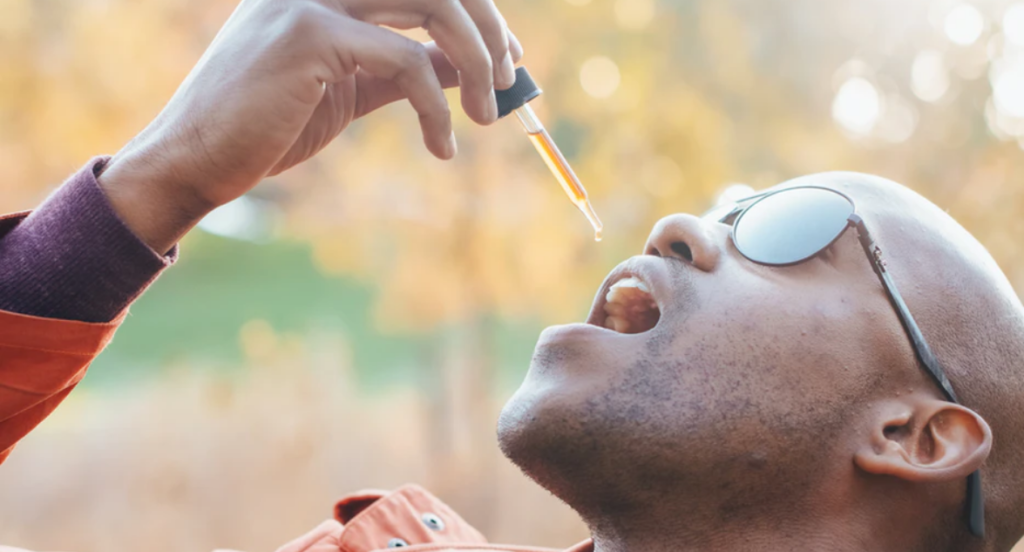
Curious about CBD oil? We’ve Got Answers!
Whether you’re new to cannabis or just curious about the product, we’ve got all the answers to the most commonly asked questions surrounding CBD oil.
What is CBD oil, and where does it come from?
CBD is one of the 113 naturally-occurring chemical compounds (also known as a cannabinoid) that is sourced from flowers and leaves from cannabis plants like marijuana and hemp. Unlike THC, CBD is not psychoactive, therefore it will not get you high regardless of your dosage.
What does CBD oil do?
CBD oil is known for playing an active role in relieving symptoms across common mental and physical health issues. Depression, anxiety, acne, cancer symptoms, heart disease and chronic or acute pain, are among the many conditions that can be eased by the recreational use of CBD.
READ MORE: WHAT RESEARCH SAYS ABOUT CBD OIL
How is it made?
One word: Extraction. This typically happens in one of two ways.
Method 1: Alcohol Extraction
CBD oil is extracted from hemp plants by first soaking the plant in an alcohol solvent like grain alcohol. Once the plant is completely soaked, the solvent evaporates, and what you’re left with is CBD-rich oil.
Method 2: CO2 Extraction
A series of chambers with pressurized carbon dioxide (CO2) extract CBD and other phytochemicals from the hemp plant through varying pressures and temperatures. At a specific temperature and pressure point, the CO2 will act as a solvent making it non-toxic and, therefore, not dangerous.
Is it legal in Canada?
As of October 2018, CBD oil and all other phytocannabinoids became legal under the Cannabis Act.
What are the best ways to take CBD?
Oral: Squirt a few drops underneath your tongue.
Consume: Whether you’re into edibles, cooking, baking, garnishing, cocktails, mocktails, smoothies or lattes – there is an abundance of opportunities to add a few drops of CBD oil to the foods and drinks you consume. It doesn’t have to be complicated, either. Drop a few into your carbonated beverage or on top of your lunch, and you’re good to go!
Topical: CBD oil can be found in serums, creams, scrubs, bath bombs and a ton of other beauty and hygiene products. It’s an incredibly popular way to use CBD and can have some pretty great benefits for your skin health.
What are the benefits of taking CBD oil?
CBD oil can potentially have many great benefits for both your physical and mental health.
Physical:
- Improve sleep
- Reduce seizures in people with epilepsy)
- Soothe acute and chronic pain
- Improve muscle tension and inflammation
- Improve heart health
- Improve symptoms of inflammatory bowel disease (IBD)
- Can alleviate cancer-related symptoms
- May reduce acne
Mental:
- Reduce anxiety
- Manage depression
- More mental clarity
- Calming, relaxing, reduces stress
READ MORE: CANNABINOIDS IN HEALTH AND DISEASE
Will it get me high?
No. Unlike THC, CBD is not psychoactive and, therefore, will not get you high. CBD will have a subtle effect on your mental state in that it may make you feel relaxed, more alert, and have a better sense of clarity. It also helps with pain management, reducing anxiety, reduces seizures, and can help you get a good night’s sleep!
Can I cook with it?
Absolutely! You can cook with it, bake with it, add a few drops to your smoothie or morning coffee, toss a few drops in a salad—your options are truly endless!
Tip: CBD oil works best with recipes that have some type of fat in them. Think butter, olive oils, coconut oil, fatty foods like nuts, avocados, etc. It’s also highly recommended to avoid high heat as these excessive temperatures can actually cause the CBD oil to evaporate, thus losing its potency.
How much CBD should someone take?
For beginners, it’s typically recommended that 15mg of CBD can be used once or twice daily and ideally, taken with food. Rather than self-dosing, it’s also recommended to speak with your doctor or registered nurse practitioner to get a better understanding of dosage for your body.
READ MORE: A SYSTEMATIC REVIEW OF CANNABIDIOL DOSING IN CLINICAL POPULATIONS
What are the possible side effects of taking CBD?
If you’re new to cannabinoids or an infrequent user, it’s best to start low and work your way up as you build a tolerance. Gauge how your body responds to CBD and make a conscious decision on what you think would be best for your body and specific needs.
Can I use CBD during pregnancy?
There isn’t enough research to provide answers on the various side effects (if any) of CBD on either the mother’s health or baby’s development. In the absence of research and on the advice of medical professionals, it’s safe to say that pregnant women and breastfeeding mothers should avoid consuming CBD oil.
Do drug tests search for CBD?
The short answer is no. But be careful with this one. Employers or other institutions won’t necessarily be searching for CBD since it does not impair judgement or motor skills. The issue is whether the CBD oil you’re using has small traces of THC—marijuana’s main active ingredient—that can linger in the body for weeks.
Are there side effects of consuming CBD oil?
Based on recent studies, some side effects include:
- Fatigue
- Diarrhea
- Increase or decrease in appetite
- Increase or decrease in weight
Learn more about cannabis and CBD oil at the Government of Canada.
Blunt
As we continue to see the cannabis industry unfold and take flight before us, we strive to become the leading global provider of real-time, high-impact multimedia news, information, and entertainment. With our vast network of millions of users, including major influencers in the cannabis industry, we continue to deliver relevant, quality content to help educate and inform.
